This post may include affiliate links. Thank you for your support.
This Homemade Jamaican Jerk Seasoning is the perfect way to spice things up and get a taste of the Caribbean in your very own kitchen! Easily mixed together in matter of mere minutes, this jerk spice blend is delicious on pork, chicken, seafood, vegetables and more! (Vegetarian, Vegan, Gluten-free, Whole 30, Paleo and Keto-compliant)
Table of Contents
About this jerk seasoning recipe
This multi-purpose Jerk spice mix is savory and spicy in taste with notes of warming, smokey and slightly sweet flavor.
This Jerk rub is perfect to have on hand when you want a taste of the islands but don’t want to leave your kitchen! It’s an easy way to add delicious, piquant flavors to chicken, pork, grilled meats, fish, seafood, vegetables, eggs and more!
Plus, this homemade Jamaican seasoning is totally customizable and allows you to be in control of the flavor profile! It can be as hot and punchy or as mild and light as you like! While prepackaged blends can be convenient, they are often overloaded with salt, MSG and unhealthy additives. Made with common pantry spices and dried herbs (no weird ingredients here!), this DIY Caribbean blend is all about the flavor with very little effort and absolutely zero additives! And, it’s a great way to use up any seasonings you have hanging around your pantry!
What is Jerk seasonings?
Jamaican jerk spice mix is a fragrant blend of dried herbs and ground spices. Jerk seasoning is savory with a rich, warming flavor and can range from slightly hot to incredibly spicy. The exact ingredients found in the seasoning blend will vary from kitchen to kitchen and family recipe to family recipe. However, the essential basic ingredients, which includes allspice, nutmeg, cinnamon, thyme, onion and garlic, can all be found growing on Jamaica’s luxuriant landscape.
Jerk seasoning can be found as dry powdered spice blend or as a solid paste. The dry spice blend should be rubbed or massaged into the meat, while the paste is wet and can be used as a marinade.
Where did jerk spice originate?
The term ‘jerk’ refers to a style of cooking where meat is rubbed with a hot spice blend and then cooked by being rotated over burning coals.
Both the jerk cooking process and the spicy mixture of Jamaican seasonings originated with the indigenous people of the Caribbean who would preserve their meat by rubbing it with a combination of salt, pepper, nutmeg and thyme.
What is in jerk seasoning?
The exact spices used in homemade Caribbean seasoning can vary greatly from kitchen to kitchen, however the most common traditional ingredients include salt, pepper, allspice, nutmeg and scotch bonnet peppers (Habanero in Jamaica, or some form of heat).
Ingredients in Jamaican jerk seasoning
- Seasoning: Salt and Pepper
- Spices: Nutmeg, Allspice, Smoked Paprika, Cumin and Cinnamon
- Aromatics: Onion Powder, Garlic Powder and Ground Ginger
- Dry Herbs: Thyme and Chives
- Heat: Cayenne
- Sugar: Light Brown Sugar
What does Jamaican jerk taste like?
Jerk spices are complex and pungent. Jerk rub has a unique warm and piquant flavor with subtle sweet, smokey and salty undertones.
How to customize seasonings for jerk?
You can easily add ingredients or adjust the measurements in this seasoning blend to make it your own! I recommend tasting and adjusting the ingredients as you go until you have created the perfect blend for you and your family!
- Like it hot? Add one or more spicier chili powders to the mix! Add crushed red pepper flakes for mild heat and Ghost pepper powder or scotch bonnet powder for more intense heat.
- Want it slightly sweeter? Swap out light brown sugar for granulated sugar!
- Prefer a lot of assertive garlic flavor? Use more garlic powder!
- Desire an earthy blend? Use more dried thyme and add a bit of dried parsley to the mix!
- Favor a fine textured seasoning mix? Place all the ingredients into the bowl of a food processor or spice blender and pulse until mixture resembles a fine powder! (The photo below shows what the seasoning blend looks like after being pulsed in a food processor. I also added crushed red pepper flakes for more heat.)
FAQS: jerk spices
Is jerk seasoning the same as creole?
While both jerk and creole seasonings are savory in flavor, they are not the same thing.
Jerk seasoning is associated with Caribbean cooking and comes from Jamaica. Jerk spice blend is much hotter and more assertive in flavor. It relies on pungent spices not found in creole seasoning such as allspice and chilies.
Creole seasoning is associated with Creole cooking and comes from the Louisiana. Creole spice blend is mild in flavor and has very little heat.
You should not use creole seasoning as a jerk substitute because it does not provide the same flavor profile or taste.
What is a substitute for Jerk spice?
Jerk seasoning has a unique and distinctive flavor. Unfortunately, there is no one spice substitute that will provide the same flavor profile as Caribbean seasoning.
If you are looking for a substitute, or if you ran out of or cannot find a prepackaged Jerk rub blend, your best bet is to make your own using the recipe below. Not only can you customize the blend to your exact taste and desired flavor profile, but the blend will keep for up to two years.
Is Caribbean jerk seasoning good for you?
Homemade jerk spice blend is both vegetarian and vegan. It is also whole 30, paleo and keto-compliant!
Plus, this homemade seasoning recipe contains no MSG! However, many prepackaged store-bought blends do contain MSG and are not keto-friendly. If you are purchasing a blend from the grocery store, always be sure to check the label!
Is this jerk spice recipe high in sodium?
The amount of sodium in spice blends will depend upon the ingredients and precise measurements used.
This homemade seasoning is easily customizable. The ingredients and amounts can be adjusted to suit your specific taste and needs. This recipe has approximately 466 milligrams of sodium per serving (1 tablespoon of seasoning). However, you can reduce or omit the kosher salt to lower the amount of sodium.
How to make this recipe for jerk seasoning
Caribbean seasoning is incredibly simple to make at home! With just a few pantry spices and dried herbs you can have a taste of the warm tropics in your very own kitchen! (Scroll down for the detailed measurements and instructions in the printable recipe card at the bottom of the page)
- Combine spices: In a medium bowl, combine all the dry seasoning ingredients. Thoroughly mix and stir ingredients together.
- Storage: Store in an airtight container in a cool, dark place for up to 1 year.
- To use: To use as a dry rub, generously sprinkle seasoning on pork, chicken, fish or shrimp. Use your hands to massage the spice mix into the meat or fish. To use as a marinade, combine seasoning with oil to form a paste or marinade and pour over meat or fish.
Storing homemade jerk seasoning
Homemade Caribbean spice blends should be stored in an airtight container in a cool, dark place away from any heat and direct sunlight. The kitchen pantry of a dark cabinet are excellent places to store dried spices.
How long will jerk blend keep?
While spice blends won’t actually go bad, they can turn stale and lose all flavor.
Properly stored homemade spice blends will last up to 1 year.
You can extend the life of your homemade spice mix by using fresh spices to begin with. Make sure your spices are fresh by checking the color and taste. The dry herb or spice should appear bright and pigmented. If the color looks dull and faded, chances are your spice has expired. Taste the spice to ensure it is still flavorful and not stale.
How to use Caribbean seasoning
Jamaican seasoning is piquant and rich in flavor. While it was traditionally used in ‘jerk-style’ cooking, the seasoning is extremely versatile and can be used on a wide variety of meats, seafoods and vegetables!
- Pork – try the seasoning on this Caribbean pork!
- Chicken
- Chicken Wings
- Ropa Vieja
- Turkey
- Shrimp or Prawns
- Fish – white fish or salmon
- Steak
- Tofu
- Tacos
- Eggs
- Rice and Cuban Black Beans – sprinkle a bit of seasoning into the water to cook rice and beans
- Roasted Cauliflower
- Grilled Bell Peppers
- Sauteed or Grilled Onions
- Grilled Squash or Zucchini
- Mojo Sauce
Add a delicious kick of flavor to your favorite chicken, pork, meat or fish with this quick and easy Homemade Jamaican Jerk Spice Mix!
Until next week, friends, cheers! To spicy island flavor, no passport necessary!
Cheyanne
Craving MORE? Follow all the deliciousness on Facebook, Pinterest and Instagram!
More recipe for homemade seasonings!
Homemade seasoning blends are the easiest way to elevate the flavor of any dish. Try these family favorite recipes next:
- Old Bay Seasoning
- Greek Seasoning
- Italian Seasoning
- Sazon Seasoning
- Homemade BBQ Dry Rub
- Best Burger Seasoning
- Fajita Spice
- Everything But Bagel Seasoning
Easy Homemade Jerk Seasoning recipe👇
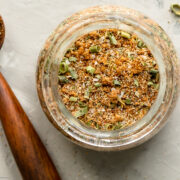
Homemade Jerk Seasoning Recipe
Recipe can be scaled up or down by using the slider if you hover your mouse over the number of Servings.
Equipment
- Medium Mixing Bowl
Ingredients
- 1 ½ Tablespoon EACH: Onion Powder, Garlic Powder & Dried Chives
- 1 Tablespoon EACH: Allspice, Dried Thyme & Light Brown Sugar
- 2 teaspoons EACH: Kosher Salt & Cayenne - or more to taste (SEE NOTES)
- 1 ½ teaspoon Ground Nutmeg
- 1 teaspoon Ground Black Pepper
- ½ - ¼ teaspoon EACH: Smoked Paprika, Cumin, Ground Cinnamon & Ground Ginger (OPTIONAL)
For Paste or Marinade:
- 2-4 Tablespoons Neutral Oil (such as canola or vegetable)
Instructions
- Combine spices: In a medium bowl, combine all the dry seasoning ingredients. Thoroughly mix and stir ingredients together.
- Storage: Store in an airtight container in a cool, dark place for up to 6 months.
- To use: To use as a dry rub, generously sprinkle seasoning on pork, chicken, fish or shrimp. Use your hands to massage the spice mix into the meat or fish. To use as a marinade, combine seasoning with oil to form a paste or marinade and pour over meat or fish.
Notes
- Be sure to use fresh dry spices! You can tell if your spices have expired by looking at their color. If the color appears muted and faded, they have probably expired.
- Make sure you taste and adjust the amount of dry seasonings, salt and Cayenne in the jerk seasoning mix to your specific taste. For the salt and cayenne, start with 2 teaspoons. You can always add more to taste.
- For a finer textured spice mix, place all the ingredients in the bowl of a food processor or a spice blender. Pulse or blend until desired consistency is achieved.
- Use 1-2 tablespoons of Jerk Seasoning per pound of meat.
Nutrition
Did you make this recipe?
Mention @nospoonnecessary on Instagram and tag it #nospoonnecessary!
©No Spoon Necessary. All images and content are copyright protected. Please do not use any images without prior permission. Please do not publish this recipe without prior consent. If you want to reference this recipe, please do so by linking directly to this post.

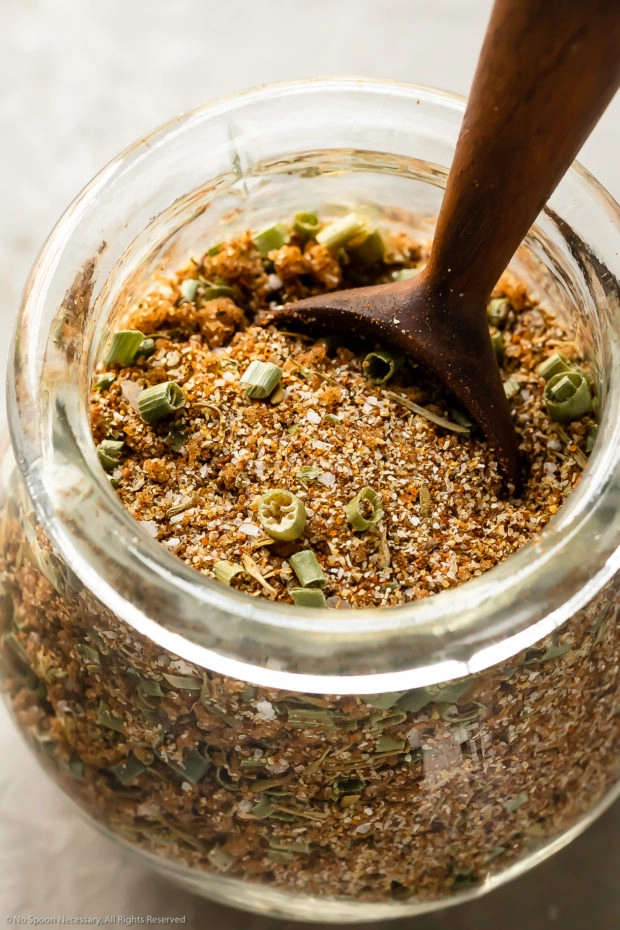
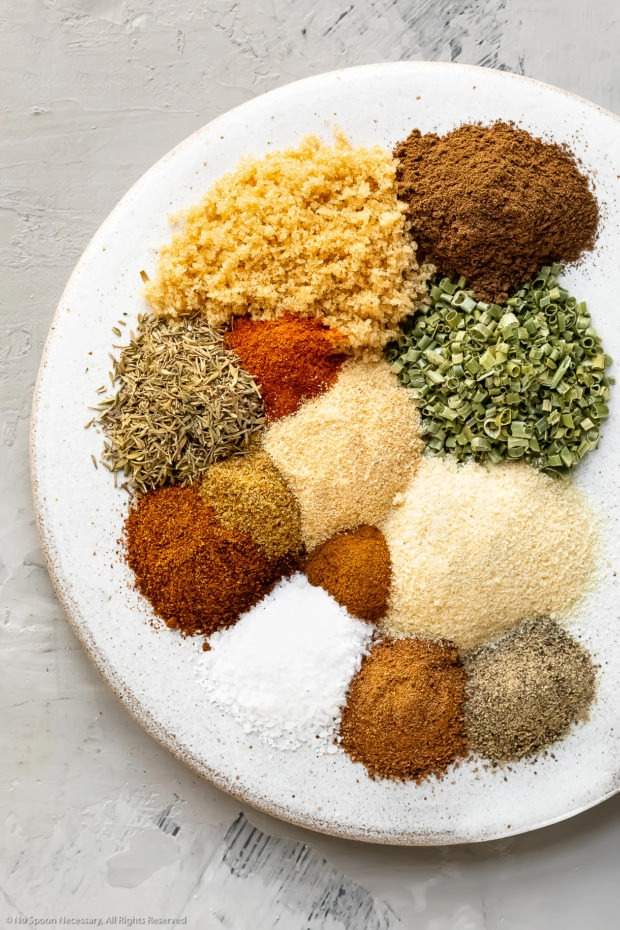
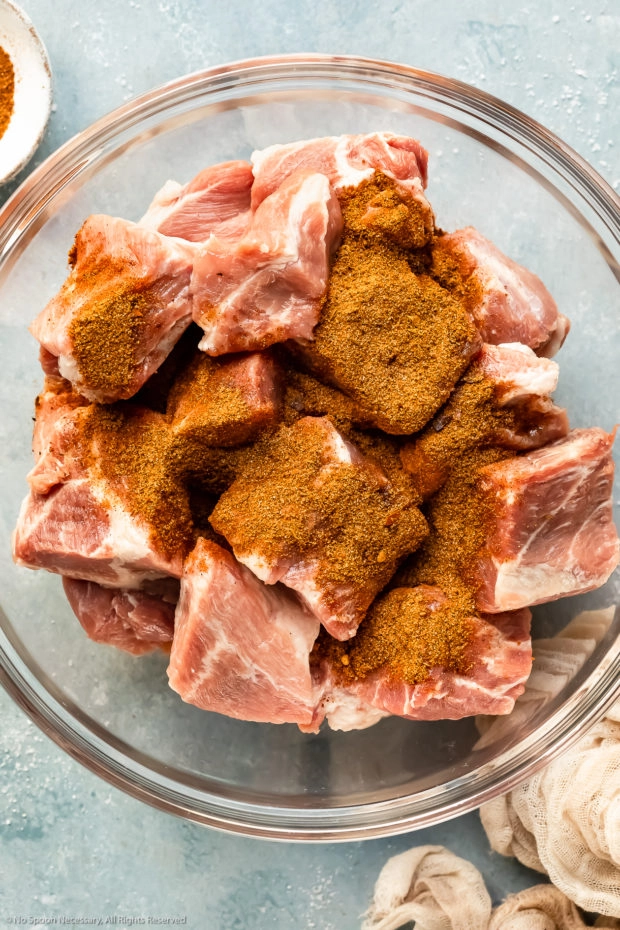
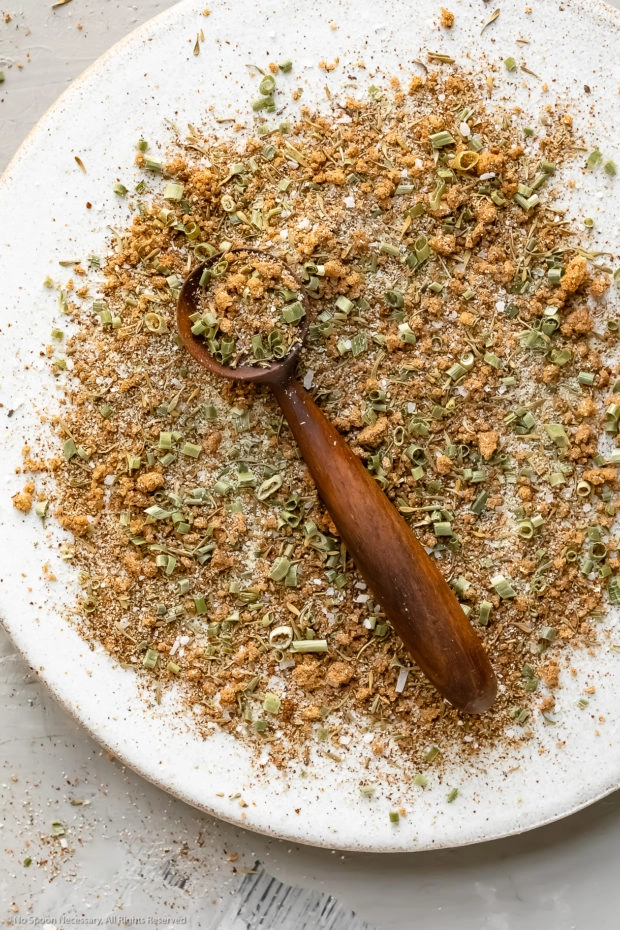
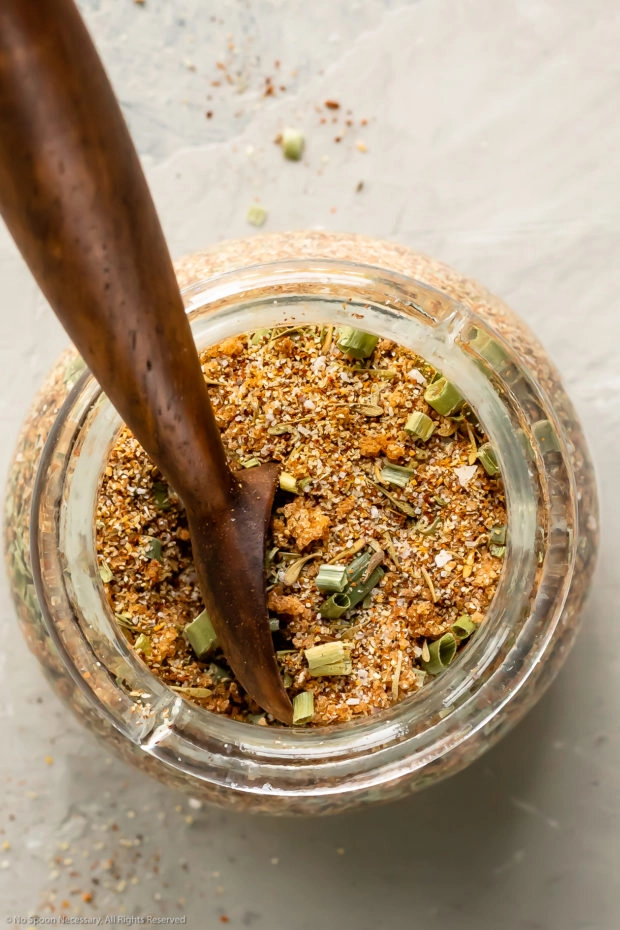
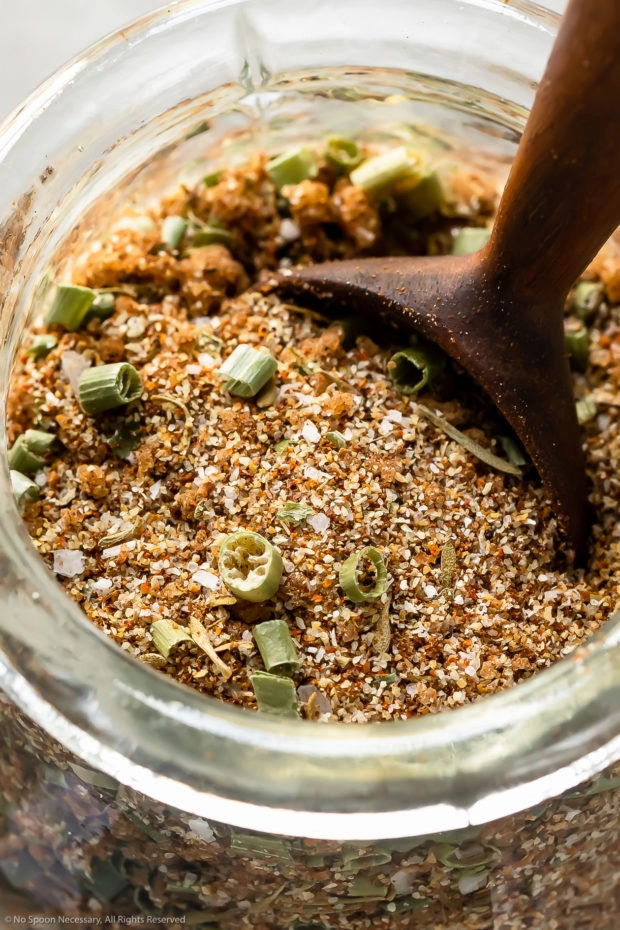
Russell
Perfect! ….except there should be a note about the shelf life.
Six months might be accurate for the container shown, but if it’s vac packed I’m sure it will last for much longer. And if it’s vac packed and frozen? Indefinitely.
Cheyanne
Hi Russell,
Thanks so much for sharing your note about vacuum sealing! 🙂
Ampusam Symonette
Thank you.
I had to replace spice leaves, cinnamon , goat pepper, all spice, browning use, brown sugar, vinegar, onion since I do not have green onions
Need this for my pork chops.
Will make some Jerk rice in a rice cooker to give the incredible menu with my corn salad. made with tomatoes onions corn drained with celery relish and vinegar add yoghurt salt to taste.
Ampusam Symonette
The Bahamas
Kelly | Foodtasia
Spicy perfection! I’m going to whip up some of this for tonight’s chicken. Love the flavors and your photos are so stunning, my friend!
Marissa
Because I have a 9 year-old’s sense of humor, all kinds of dumb jokes about seasoning jerks comes to mind, lol! But the truth is, I’m seriously excited to try this! Homemade spice blends are the best because they’re fresher and you can tinker with the quantities to make it your own. Thank you!!
Ben @ Havocinthekitchen
While I am not really into spicy food, I like some Jerk Chicken once in a while, so this Jamaican Jerk Seasoning is right up my valley! But you know what? I never realized you can use jerk seasoning in so many ways – I have always thought it must be chicken or beef. Silly me! 🙂
Mary Ann | The Beach House Kitchen
One of our all time favorite seasonings Chey! I always have a jar full in my pantry. We use it on chicken, pork, fish…all kinds of things. Can’t wait to try your version! Pinned!
angiesrecipes
I too prefer to make my own spice blend…this is definitely something I have to try! Thanks, Chey, for sharing another awesome recipe.
Kelsie | the itsy-bitsy kitchen
I always prefer to make my own seasoning blends because I’m so hesitant about all the weird stuff in the pre-packaged versions. And I always like my seasonings on the spicier side, so customizing them is necessary! Next time I make jerk anything, I’ll be whipping up this recipe for sure!